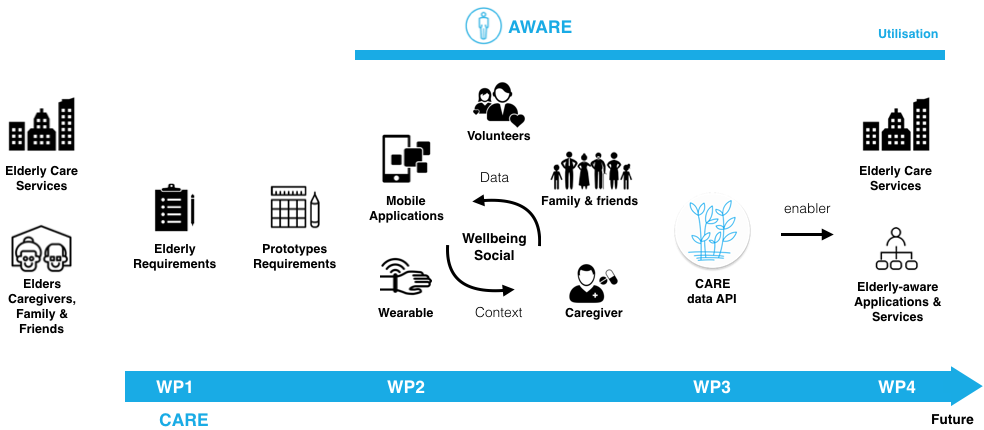The Center for Ubiquitous Computing was awarded one of the highly competitive Academy of Finland Key Funding grants, CARE: Context-awareness for Elderly Care. This project reutilises the AWARE framework within the domain of elderly care.

Globally, society is ageing at a fast pace, with the population aged 60 and over, representing the fastest-growing group. In Finland, 27% percent of citizens are over 60, and this number is expected to grow to more than 32% by 2050. Due to different kinds of losses (e.g., death of loved ones, impairing illness), loneliness/social isolation becomes a severe threat, leading to major health problems among the elderly. Deficiencies in social relationships increases risk of developing coronary heart disease (CHD) and stroke, and loneliness is comparable with well-established risk factors for mortality such as smoking and alcohol consumption. Requiring constant attention, between 65-74 year olds, 20,3% of Finns report severe limitations in performing daily activities, higher (29,7%) for 75-84 year olds. This affects family’s stability, increases caregivers’ workload and leads to a severe upshot on the country’s health expenditure. According to an OECD report published in 2015, the Finnish health system is chronically underfunded, spending approximately €3,000 per year, per capita, on health care services. To fight elderly loneliness, since the beginning of 2016, students are given cheaper rents in Finnish seniors home around Helsinki, in exchange for participation on a variety of activities with cohabiting seniors, such as playing music or cooking. This initiative improved drastically elders’ mood and allows them to nurture new social bonds.
Led by Adj. Prof. Denzil Ferreira, CARE’s objective is to take advantage of smartphones’ popularity and wearables’ sensing capabilities to fight loneliness/social isolation, help reduce caregivers’ workload and thus elderly care costs, by means of context-awareness. Specifically, by capturing fine- grained data of non-critical, non-intrusive health-related physiological measurements, e.g., skin temperature to detect fever and sleeping quantity; accelerometer to detect physical activity and sleep quality; skin conductance to detect pain and stress; and Bluetooth Low-Energy to detect the proximity of others and social interaction, we collect invaluable data on different wellbeing and social conditions, useful to enable context-aware elderly-oriented applications and services. As we inform caregivers and family members of wellbeing and social measures (e.g., insufficient social interaction, feeling feverish or stressed), we may encourage and inform social engagement needs with the elders, improving elders’ quality of life.
This project implementation is executed by the following members of our Center: Simon Klakegg; Hanna-Leena Huutunen; Niels van Berkel; and Aku Visuri.
This work is funded by the Academy of Finland Key Funding and is a collaboration effort between our Centre and Oulun Palvelusäätiö, Haltian Oy, BusinessOulu and Oulu’s Health Labs, executed between October 2016-September 2018.
Updated:
- We just published CARE’s first year summary. Read more…

